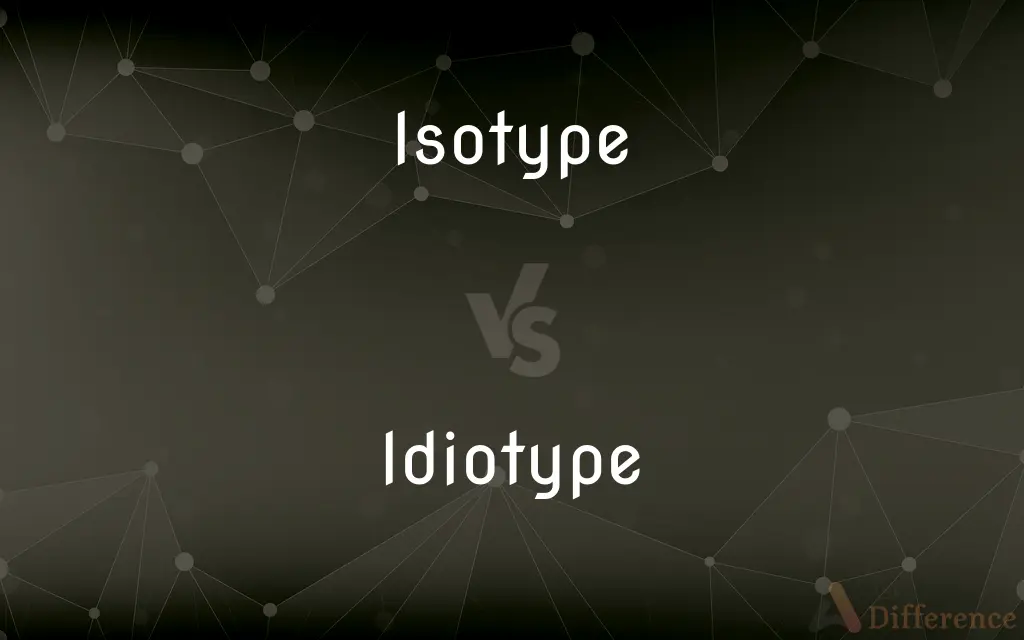Isotype vs. Idiotype — What's the Difference?
By Tayyaba Rehman & Urooj Arif — Published on February 18, 2024
Isotype refers to the class of an antibody determined by its constant region. Idiotype refers to the unique antigen-binding site of an antibody, determined by its variable region.

Difference Between Isotype and Idiotype
Table of Contents
ADVERTISEMENT
Key Differences
Isotype and idiotype are terms used to describe different characteristics of antibodies, which are crucial components of the immune system's ability to recognize and neutralize pathogens. The isotype of an antibody refers to the class or subclass of the antibody, which is determined by the heavy chain constant regions. These classes include IgG, IgM, IgA, IgD, and IgE in humans, each serving different roles in the immune response, such as crossing the placenta (IgG) or mediating allergic reactions (IgE).
The idiotype, on the other hand, refers to the unique set of antigen-binding sites of an antibody, determined by the variable regions of both the heavy and light chains. The idiotype is essentially the part of the antibody that binds to a specific antigen, and its uniqueness means that different antibodies can have different idiotypes, even if they target the same antigen. This specificity is key to the immune system's ability to target a vast array of pathogens.
The distinction between isotype and idiotype is significant because it highlights two fundamental aspects of antibody function: class determination and antigen specificity. While the isotype determines the antibody's role within the immune response, the idiotype determines its specificity for a particular antigen. This dual characterization is essential for understanding how antibodies work to protect the body from infection.
Isotype classification is critical for understanding the nature of the immune response during infections, vaccinations, and autoimmune diseases, as different isotypes are associated with different phases of the immune response. Idiotypes are central to vaccine development and diagnostic tests, where specificity for particular antigens is crucial.
In essence, while both isotype and idiotype are integral to the function and diversity of antibodies, they describe different aspects: isotype refers to the antibody's class and general role in the immune system, whereas idiotype refers to the antibody's specific antigen-binding capability. Understanding these differences is crucial for research and clinical applications in immunology.
ADVERTISEMENT
Comparison Chart
Definition
Class of antibody determined by constant regions
Unique antigen-binding site determined by variable regions
Function
Determines role in immune response (e.g., placental transfer, allergic reactions)
Determines specificity for particular antigens
Importance
Crucial for understanding immune response mechanisms
Key to targeting specific pathogens and vaccine development
Variability
Limited to specific classes within a species
Highly variable, even among antibodies targeting the same antigen
Clinical Relevance
Used to diagnose and monitor diseases, guide treatment decisions
Targeted in vaccine design and diagnostic tests for specificity
Compare with Definitions
Isotype
Determines functional properties of antibodies.
Antibodies of the IgE isotype are involved in allergic reactions.
Idiotype
Defined by the variable regions of antibody chains.
Variations in the idiotype are crucial for the diversity of the immune response.
Isotype
Classified into five major types in humans.
Each isotype, from IgG to IgE, plays a unique role in immunity.
Idiotype
Central to the design of monoclonal antibody therapies.
Monoclonal antibodies are developed by identifying a specific idiotype.
Isotype
Represents the class of an antibody based on its heavy chain.
The IgM isotype is the first antibody produced in response to an infection.
Idiotype
The unique part of an antibody that binds to a specific antigen.
The idiotype's specificity allows for targeted immune responses.
Isotype
Constant across individuals of the same species.
The isotype defines the antibody's role across all humans.
Idiotype
Unique to each antibody, even against the same antigen.
Even for a single antigen, multiple idiotypes can exist.
Isotype
Affects distribution and action of antibodies in the body.
The IgA isotype is predominant in mucosal areas, protecting against pathogens.
Idiotype
Can be mimicked in vaccine development for specific immunity.
Vaccines sometimes use idiotype mimicry to elicit targeted immune responses.
Isotype
A biological specimen or other element that is a duplicate of the holotype.
Idiotype
The complete set of idiotopes contained within the variable region of a particular immunoglobulin molecule and making up the molecule's antigen binding site.
Isotype
Any of several classes or subclasses of immunoglobulins, such as immunoglobulins A and G, that are distinguished by differences in the amino acid sequence of the constant regions of their heavy chains. All isotypes are usually found in every individual of a species.
Idiotype
(immunology) A characteristic shared by a group of immunoglobulin or T-cell receptor molecules, based on the antigen-binding specificity of their variable region; and thus, the resultant immunologic phenotype, which can often be specific to a person or to only a small percentage of people.
Isotype
(immunology) A marker corresponding to an antigen found in all members of a subclass of a specific class of immunoglobulins
Isotype
A duplicate specimen of the holotype, from the same genetic individual.
Common Curiosities
Can two antibodies have the same idiotype?
Yes, if they bind to the same antigen in the exact same way.
Why is isotype diversity important?
It allows the immune system to respond effectively to different types of threats.
What is an antibody isotype?
It's the class of an antibody, defined by its constant region.
How many isotypes are there?
Humans have five main isotypes: IgG, IgM, IgA, IgD, and IgE.
What defines an antibody idiotype?
The unique antigen-binding site, determined by its variable region.
Do all animals have the same isotypes?
No, different species can have different sets of isotypes.
How does isotype switching occur?
Through a process called class switch recombination, influenced by cytokine signals.
How do idiotypes contribute to vaccine development?
By targeting specific idiotypes, vaccines can elicit precise immune responses.
Can the idiotype affect the isotype?
No, they operate independently; one determines specificity, and the other class function.
How does the body select which isotype to produce?
Isotype switching is influenced by the nature of the antigen and the cytokines present.
How is idiotype diversity achieved?
Through genetic recombination and somatic hypermutation processes.
Can idiotype variations affect immunity?
Yes, variations can enhance the immune system's ability to recognize diverse pathogens.
Why are idiotype-specific therapies promising?
They offer targeted treatment by precisely identifying and neutralizing specific antigens.
Are isotype and idiotype classifications used in medical diagnosis?
Yes, they can help diagnose and monitor diseases, such as immunodeficiencies and allergies.
Are monoclonal antibodies specific to an idiotype or isotype?
They are specific to an idiotype but also belong to a particular isotype.
Share Your Discovery

Previous Comparison
Honda vs. Hyundai
Next Comparison
Grand Slam vs. Home RunAuthor Spotlight
Written by
Tayyaba RehmanTayyaba Rehman is a distinguished writer, currently serving as a primary contributor to askdifference.com. As a researcher in semantics and etymology, Tayyaba's passion for the complexity of languages and their distinctions has found a perfect home on the platform. Tayyaba delves into the intricacies of language, distinguishing between commonly confused words and phrases, thereby providing clarity for readers worldwide.
Co-written by
Urooj ArifUrooj is a skilled content writer at Ask Difference, known for her exceptional ability to simplify complex topics into engaging and informative content. With a passion for research and a flair for clear, concise writing, she consistently delivers articles that resonate with our diverse audience.














































